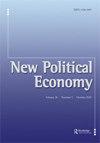超越语境:在企业责任研究中认真对待政治经济学
IF 3.8
2区 经济学
Q1 ECONOMICS
引用次数: 0
摘要
本文主张在研究转型期司法程序中的公司问责时,应重视政治经济学。企业行为者现在普遍参与过渡司法(即在大规模暴力事件发生后伸张正义的努力)。然而,这些文献仍然受限于将政治经济视为背景的倾向,而不是作为干预与战争有关或专制暴力以及使企业行为者负责的努力的结构性因素。本文提出了三个转变,以更好地理解TJ中公司责任的政治经济学:从关注战争的直接经济原因到战前、战时和战后经济的谱系观;更全面地看待冲突筹资问题;从强调战争的政治经济学到强调暴力的政治经济学。这些转变使我们能够分析更多种类的企业问责政治经济,解决更分散的暴力和不公正责任,并涵盖持续时间较长的暴力形式。虽然这些论点对该领域具有更广泛的相关性,但也以前南斯拉夫地区和波斯尼亚战争为例加以说明。本文章由计算机程序翻译,如有差异,请以英文原文为准。
Beyond context: taking political economy seriously in the study of corporate accountability
The article argues for taking political economy seriously in the study of corporate accountability in transitional justice processes. Corporate actors are now commonly involved in transitional justice (that is, attempts at doing justice in the aftermath of mass violence). However, the literature is still limited by an inclination to treat political economy as context, rather than as a structuring factor intervening both on the war-related or authoritarian violence and on the efforts to make corporate actors accountable. This article proposes three shifts towards a better understanding of the political economy of corporate accountability in TJ: from a focus on the proximate economic causes of war to a genealogical view of pre-war, wartime and post-war economies; towards a more holistic view of conflict financing; and from an emphasis on the political economy of war to the political economy of violence. These shifts allow us to analyse a greater variety of political economies of corporate accountability, address more diffuse responsibilities for violence and injustice, and cover forms of violence that extend over longer periods of time. While holding broader relevance for the field, the arguments are illustrated with reference to the former Yugoslav region and the Bosnian War.
求助全文
通过发布文献求助,成功后即可免费获取论文全文。
去求助
来源期刊

New Political Economy
Multiple-
CiteScore
10.10
自引率
9.50%
发文量
41
期刊介绍:
New Political Economy aims to create a forum for work which combines the breadth of vision which characterised the classical political economy of the nineteenth century with the analytical advances of twentieth century social science. It seeks to represent the terrain of political economy scholarship across different disciplines, emphasising original and innovative work which explores new approaches and methodologies, and addresses core debates and issues of historical and contemporary relevance.
 求助内容:
求助内容: 应助结果提醒方式:
应助结果提醒方式:


